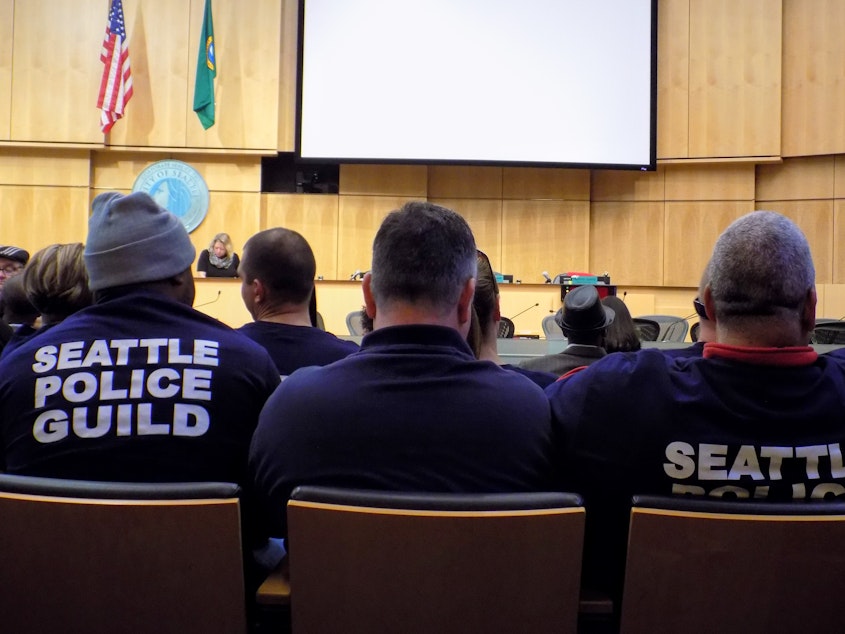Big labor makes big demands of Seattle police: Will it mean change?

Big labor is making big demands of Seattle's police union: Get on board with new reforms to address institutional racism and unconstitutional policing, or risk being expelled from the King County Labor Council.
It's a big deal because Seattle is a labor town.
The MLK Council represents over 150 unions and over 100,000 workers. It arguably has more sway over Seattle city politics right now than any other organization. Labor council-backed candidates currently have a supermajority on the Seattle City Council.
The City Council voted to approve police union's last contract in 2018, with some reservations, by an 8-1 vote despite objections of some police critics. At that time the Labor Council backed the contract.
But if the police union -- the Seattle Police Officers Guild, aka SPOG -- gets kicked out of the labor council now, it also loses the protection that comes with being a member of the umbrella organization. Such a move could put tremendous pressure on elected officials to bargain hard with SPOG in future contracts.
SPOG’s current president is Mike Solan was elected by rank and file officers last year on a pledge to change what he called the “anti-police” narrative in Seattle politics. He argues that police offers are “being held to an unreasonable standard.”
Solan replaced Kevin Stuckey, who was widely considered more moderate and who reportedly worked closely with the county labor council.
The latest tensions over SPOG within the labor council started when a group of teachers in White Center circulated a petition among Black, Indigenous and People of Color union members, which called for SPOG to be kicked out of the council immediately. They submitted over 500 signatures to council leadership.
“Historically, the labor movement has sacrificed black and brown workers for the sake of a white labor movement,” said isaura jiménez guerra, a petition organizer, union member and teacher in White Center.
In response to the petition and the protests against police brutality in Seattle and around the country, the labor council’s executive committee decided to act and issued a resolution.
It makes three demands of SPOG:
- First, a meeting with council leadership, which was scheduled this week (for Tuesday, June 9). But SPOG cancelled according to someone familiar with the meeting because officers “couldn’t get the leave due to the civil emergency.”
- The second demand is for SPOG to acknowledge that racism is a structural problem in law enforcement that needs to be fixed. Jane Hopkins, head of SEIU 1199, a health care workers union, said supported this resolution to send a message to SPOG.
“You need understand that our basic value is racial justice, and you need to make that commitment that you understand that your organization has had systematic racism for years,” Hopkins said.
- The third demand is for SPOG to work with labor on anti-racism and on future contracts to make sure they have more “police accountability” built in. Critics of policing in Seattle and nationally have argued that a change in police union contracts is the key to real reform. They argue under current contracts it can be difficult to hold individual officers accountable in instances of police brutality, for example.
Members of MLK Labor will meet June 17 to decide whether to bring their resolution to vote on expelling SPOG from the organization.
The Seattle Police Officers Guild could not be reached for comment on this story.
But in a press conference this week outside Seattle’s East Precinct, Officer Mike Solan said the Police Guild “strongly condemned” the death of George Floyd at the hands of a Minneapolis police officer and “fully support” protests against that.
But Solan also defended police tactics, which have included the use of tear gas and rubber bullets. And he drew a distinction between “peaceful protests” and physical violence against SPD officers.
“Our people are being hit with projectiles, rocks, explosive devices that injure them. I've had a close friend of mine almost lose his right eye,” he said. Solan also claimed city officials are withholding video evidence of unprovoked violence against police officers taken outside Seattle’s East police precinct, which has been the location of nightly protests. He called on the city to release the footage to the media and to the public.
Solan said when it comes to police reforms, his members are willing to discuss it. “We're police professionals. And our oath of service binds us with our community, as I mentioned. And we are open to any dialogue at any time,” he said.




